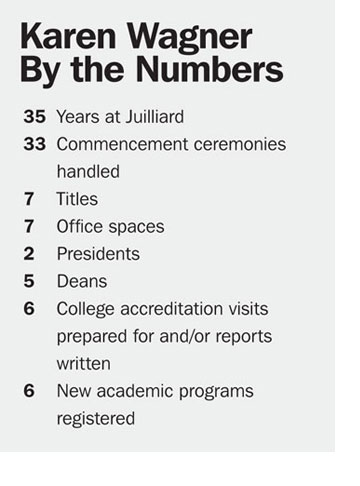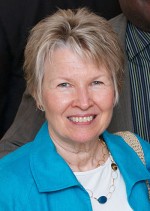Title
Ara Guzelimian, Juilliard’s provost and dean, describes her as “the course whisperer.” She’s the person the students, staff, and faculty members call on to get their curriculum questions answered, their problems solved, their policies shaped. But now, after 35 years at Juilliard that began with a part-time stint as a financial aid counselor and culminated in her current role as vice president and dean of academic affairs, Karen Wagner is retiring in January.
Body
Her myriad successes and clear affinity for administration notwithstanding, Wagner notes that her career was in some ways an accidental one. Born in Philadelphia and raised in a small college town near Valley Forge, Pa., she planned to become a singer and came to New York initially to enroll in the master’s program at the Manhattan School of Music. While she was there, Wagner started working part-time in the business office in 1970 to help pay the bills. After finishing her degree she continued working in the financial aid office—and, as she tells the story, in 1978, was asked to apply for a job as a financial aid counselor at Juilliard, which is how she got her start here. She also worked as a freelance musician, and one job was singing at a church in the Bronx, a gig that led to her being invited to lead the responsorial psalm when Pope John Paul II was visiting the U.S. and celebrated mass at Yankee Stadium in 1979.
After starting out in the financial aid office at Juilliard, Wagner became the associate registrar, registrar, and associate dean until being promoted to her current position in 1994. In speaking of her rise through the ranks, she jokingly refers to herself as the “poster child for being kicked upstairs.”
Joking aside, though, Wagner soon found that she felt at home as an administrator. Her early work in the financial aid and registrar’s offices introduced her to student record management, and as a detail-oriented person, Wagner felt that these bureaucratic niches suited her. “I like being organized and I like facilitating,” she told The Journal, adding “and I love forms!”
Wagner uses the phrase “connecting the dots” to describe the essence of what she does at Juilliard—she’s a liaison between the administration, faculty, and students, and as such, tries to ensure that information regarding curriculum and policy is clearly communicated among the School’s constituents. She has also spent countless hours working with students to ensure that they fulfill their program requirements and walk across the stage on commencement day. Of course much of the Juilliard community is involved in her annual campaign to rally the troops and lead the charge toward each successful commencement or, as she calls it, the most important academic affair of the year.
 Among her many innovations at Juilliard, Wagner says she is proudest of having created and instituted the special grades of “MX” and “PX” (“Medical Excuse” and “Professional Excuse”); she also participated in the articulation and implementation of several curriculum overhauls including the most recent one, which culminated last year in the institution of the Music Theory and Analysis program.
Among her many innovations at Juilliard, Wagner says she is proudest of having created and instituted the special grades of “MX” and “PX” (“Medical Excuse” and “Professional Excuse”); she also participated in the articulation and implementation of several curriculum overhauls including the most recent one, which culminated last year in the institution of the Music Theory and Analysis program.
Though she’s witnessed hundreds of changes during her time at Juilliard, including multiple changes in the physical space, a technological revolution, and the creation of Jazz Studies, Historical Performance, and the Drama M.F.A. program, Wagner said that the artistic excellence of the faculty—and handing that down to the students—is the one true constant. “The passing down of these incredibly rich traditions from faculty member to faculty member remains the through line. It’s why students come here, and it’s what makes Juilliard what it is.”
Wagner has also been part of that creative ferment. She has maintained her longtime interest in writing throughout her Juilliard years, taking fiction and nonfiction writing courses at the New School and earning a master’s degree in English education from New York University along the way. From 1993 to 2006, she taught Juilliard’s graduate elective in business writing, which was formatted around the narrative components of the Fulbright application (she’s been in charge of the School’s Fulbright program since 1994). And faculty member Eric Ewazen (M.M. ’78, D.M.A. ’80, composition) set a collection of her poetry to music, which was called SeaSkye Songs and which was premiered by a faculty ensemble at Paul Hall.
Wagner has loved “being in this incredibly talented, generous, vulnerable community of teachers and students,” she said, and that’s what she’ll miss most about working here. A few years ago, a parent noticed Wagner looking at that year’s graduating class photo and, not knowing who she was, asked which of the smiling faces in the class photo was hers. “They’re all mine!” she said.





